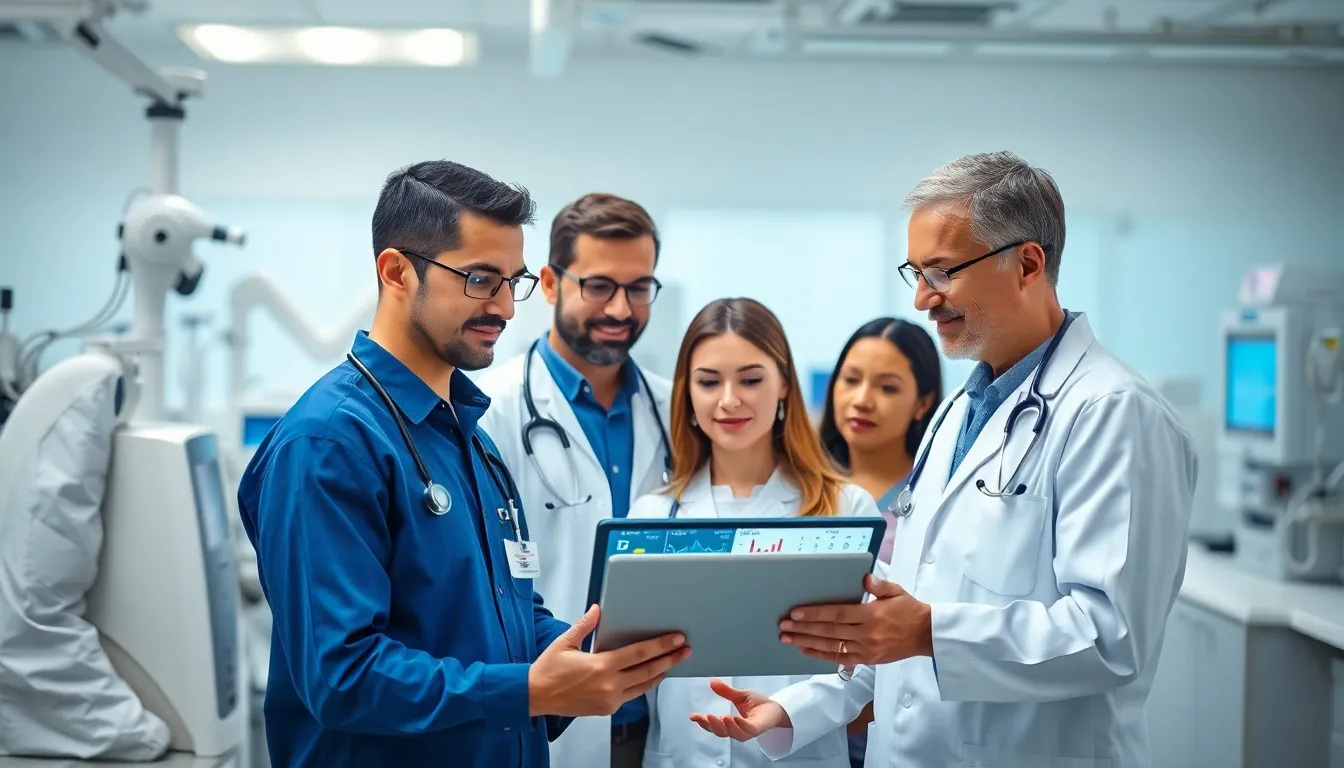In a world where health tech meets high-tech, medical device software development companies are the unsung heroes. They’re the wizards behind the curtain, crafting the software that keeps our favorite medical gadgets running smoothly. Without them, your trusty heart monitor might just be a fancy paperweight.
These companies are not just coding wizards; they’re also problem solvers, innovators, and, let’s face it, a bit of a lifesaver. With the ever-growing demand for smarter, more efficient medical devices, the pressure’s on to deliver top-notch software that’s as reliable as your morning coffee. So, whether it’s a sleek app for tracking glucose levels or software that helps surgeons navigate complex procedures, the folks in this industry are shaping the future of healthcare—one line of code at a time.
Table of Contents
ToggleOverview Of Medical Device Software Development Companies
Medical device software development companies play a pivotal role in advancing healthcare technologies. These firms specialize in creating software that enhances the functionality of devices like diagnostic tools and therapeutic equipment. Innovators in this space design solutions that meet stringent regulatory standards set by organizations like the FDA.
Focus typically lies on user experience and safety, as healthcare professionals and patients rely heavily on these applications. Development processes incorporate methodologies such as Agile and DevOps to streamline production while maintaining quality. Large firms often collaborate with startups, blending expertise and fresh ideas to drive innovation.
Expert developers prioritize both security and compliance. Medical device software must undergo rigorous testing to ensure it performs reliably in critical situations. Many companies leverage cutting-edge technologies such as artificial intelligence and machine learning to improve device capabilities.
In addition, it’s common for these organizations to offer maintenance and technical support after deployment. Continuous updates and improvements keep software aligned with the evolving needs of the medical industry.
Noteworthy examples of successful companies include Cerner Corporation and Philips Healthcare. Each exemplifies dedication to enhancing medical outcomes through effective software solutions. As healthcare data grows, the need for efficient and powerful software development becomes increasingly essential, highlighting the integral role of these companies in the future of healthcare.
Key Services Offered

Medical device software development companies provide various essential services tailored to enhance medical technology applications.
Custom Software Development
Custom software development enables companies to create tailored applications that meet specific healthcare needs. Solutions range from designing intuitive user interfaces to developing complex algorithms for patient data analysis. Each project incorporates unique requirements, ensuring medical devices function efficiently and safely. Extensive expertise in software engineering allows firms to integrate advanced technologies like AI, which improves diagnostic accuracy and patient monitoring. Additionally, these services prioritize collaboration with healthcare providers to ensure end-user needs are met effectively throughout the product lifecycle.
Regulatory Compliance Support
Regulatory compliance support is crucial for the success of medical device software. Companies guide developers in navigating complex regulations set by the FDA and similar organizations. This involves implementing best practices for quality assurance and risk management. By creating documentation and validation processes, they ensure adherence to standards like ISO 13485. Their commitment to compliance minimizes risks and facilitates smoother approval processes for new medical devices. Furthermore, regular audits and updates are conducted to maintain compliance as regulations evolve, protecting both manufacturers and patients.
Importance Of Choosing The Right Company
Selecting a top-tier medical device software development company greatly influences product quality and compliance. A strong partnership in this field ensures efficient project execution and successful outcomes.
Expertise In Medical Standards
Companies specializing in medical device software understand regulatory requirements. They excel in adhering to standards set by organizations like the FDA. Familiarity with international regulations, such as ISO 13485, reinforces their credibility. Such expertise ensures products maintain quality from conception to market launch. Through in-depth knowledge of verification and validation processes, these companies guarantee compliance throughout development. Choosing firms with proven track records helps mitigate risks related to certification delays or failures.
Experience With Industry-Specific Challenges
Navigating the complexities of the healthcare sector presents unique challenges. Knowledgeable companies bring valuable experience handling these intricacies. Familiarity with industry-specific hurdles, such as interoperability and data security, enhances project success. Developers understand the necessity of integrating software with existing systems and electronic health records. This experience leads to smoother implementations and increased user satisfaction. Selecting a partner with a history of addressing similar challenges provides confidence in overcoming potential roadblocks during development.
Emerging Trends In Medical Device Software
Medical device software development companies continuously adapt to innovative technologies, enhancing the functionality and efficacy of healthcare solutions. Emerging trends reflect the industry’s shift toward advanced capabilities and improved patient outcomes.
Artificial Intelligence Integration
Artificial intelligence (AI) shapes the future of medical device software. Companies leverage AI to analyze patient data, improving diagnostic accuracy and treatment personalization. Predictive analytics, powered by AI, helps identify potential health issues before they escalate. Furthermore, AI algorithms support clinical decision-making, reducing the potential for human error. For example, AI-driven image analysis enhances the speed and precision of radiology assessments. Integrating AI into medical devices also streamlines workflows, allowing healthcare professionals to focus on patient care.
Internet Of Things (IoT) Applications
IoT applications transform how medical devices communicate and operate. Devices equipped with IoT technology facilitate real-time monitoring of patient health metrics. These connected devices gather data and send it to healthcare professionals, enabling timely interventions. Wearable devices, such as heart rate monitors and glucose trackers, exemplify this trend, providing continuous feedback on patient conditions. Data collected through IoT applications can also enhance treatment plans, ensuring tailored healthcare solutions. Overall, IoT integrations drive efficiency and enhance patient engagement in their health management.
Medical device software development companies are essential in advancing healthcare technology. Their expertise ensures that devices not only meet stringent regulatory standards but also enhance user experience and safety. As the industry evolves with innovations like AI and IoT, these companies remain at the forefront of transforming patient care.
Choosing the right development partner can significantly impact product quality and compliance. By leveraging industry knowledge and best practices, these companies help navigate complex challenges while delivering reliable solutions. As healthcare continues to grow and change, the role of medical device software developers will only become more critical in improving outcomes and fostering innovation.



